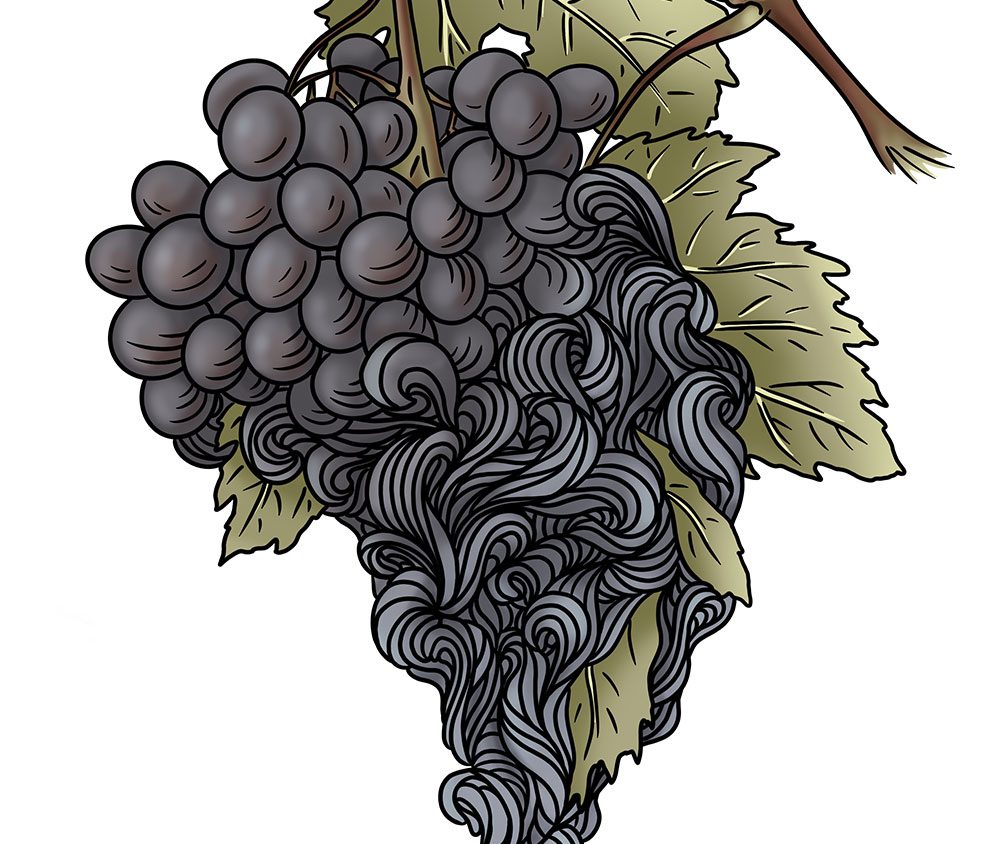First there was the late February snowstorm with almost 19 inches of snow recorded at the Eugene airport. Then there was the early April rainstorm with 4.3 inches of rain falling in a short amount of time. Areas around Eugene and Corvallis flooded — including Highway 34, which connects Corvallis to I-5.
Lane County agencies reported $17,339,039 in public infrastructure damages from the snowstorm alone.
Curling up for warmth with a glass of wine during those February days of no power led to this question: Did the storms, the recent rains in particular, affect future wine- and beer-making by damaging grapes and hops?
After all, crazy weather — climate change — has lingering effects.
For example, last summer’s wildfire season affected grape growers in southern Oregon. Justin King, national sales manager at King Estate Winery, says that if a wildfire is very close to a vineyard “and the smoke is still very concentrated when it hits the grape skins,” then smoke-affected wine can have an “ash-y” flavor.
“I feel the biggest threat to Oregon viticulture and tourism is seasonal fires,” King says. “It’s certainly been disruptive for many growers in southern Oregon and is showing itself to be a perennial issue for the industry.”
King Estate and Willamette Valley Vineyards are part of Oregon Solidarity Wines, a project that helped Rogue Valley winegrowers who were notified their fruit contracts were canceled just days before they were to be picked by a California winery that cited smoke taint from last year’s fires. The winery rejected more than 2,000 tons of fruit — $4 million of contract value — according to Oregon Solidarity.
King says “much of the fruit that was canceled by the California winery was not affected by smoke” and that is the fruit comprising Oregon Solidarity project wine. He says all net proceeds from the sale of Oregon Solidarity wines will be passed back to the southern Oregon growers.
He says: “There were vineyards in southern Oregon that were very much affected by the fires and did suffer from smoke contamination.” And in that regard, King says, “I think our forestry management professionals do a fantastic job, but we may need to be devoting more resources to that department if we want to prevent a repeat of the previous few years.”
Looking ahead, the National Interagency Fire Center is predicting an above-average wildfire season this summer for the West Coast, and Oregon has had three wildfires already.
King says the April showers were actually helpful because King Estate doesn’t irrigate, “so we rely on the rain that falls throughout the year.” And flooding was not an issue because the sloped hills for grape growing maximize sun exposure as well as drainage.
King Estate also doesn’t “typically plant as much in lower-lying areas of our property because frost can tend to gather in those areas during the early spring and damage buds.”
Climate change can have some benefit for growers, King says, as “to some extent we benefit from increased light and heat in the vineyard, but there is strong recognition that a rapidly changing climate can bring extremes that are likely to hurt or hinder more than help.”
Your beer, however, is another matter.
Shaun Townsend, Oregon State University hop breeder, says, “It’s hard to predict exactly what will happen to the hops crop this year,” but he says that the excess water and flooding “could potentially create some problems with disease issues, particularly downy mildew.”
Townsend explains that one of the management strategies used to deal with the pathogen, a fungus that attacks plants in April and early May, “is to defoliate the hop plants during the first two weeks of April.”
In other words, growers remove any aboveground growth to help control downy mildew and sync the plants for harvest, he says.
Townsend says that “if growers were not able to get into their hop fields and defoliate during that window,” then the chance goes up “that they might need to apply additional fungicide treatments this year to control downy mildew.”
“The plants will likely survive the excess water, Townsend says, but “an increase in pathogen pressure is what I suspect might happen this growing season.”
The snowstorm, as devastating as it was to trees and electrical power in the area, seems not to have been too hard on crops like grapes and hops. Townsend says that hop plants tolerate those kinds of conditions “just fine.”
The IPA requisite does “quite well in areas north of us in which winters are more severe so the odd snowstorm that we have in the Willamette Valley is not an issue,” he adds.
